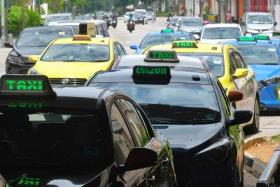Grab zeroes in on street hails
Ride-hailing platform unveils GrabNow for Jakarta, says talks already underway to implement street-hail service here
Five years after launching with just a taxi booking service, Grab has become the largest ride-hailing platform in South-east Asia.
It facilitates as many as 2.5 million rides each day, with more than 930,000 drivers in 55 cities and seven countries.
Now, the ride-hailing platform is eyeing a new slice of the market - street hails.
At an event marking the company's fifth anniversary yesterday, the ride-hailing platform unveiled GrabNow, its latest service for GrabBikes in Jakarta.
Commuters just have to tap on the street hailing option, which generates a code.
The GrabBike driver then enters the code into his app, and the ride is booked.
GrabNow is feasible in Jakarta, where GrabBike drivers tend to gather in small clusters while waiting for bookings, said Grab's group chief executive and co-founder Anthony Tan.
In Singapore, where private-hire cars are not allowed to pick up street hails, Grab is working with the authorities to see how the service can be implemented.
Co-founder Tan Hooi Ling says there is no specific date Grab is looking at to roll out the service here.
"But as you can see from everything else we have launched at Grab, things move pretty quickly. So keep your eyes peeled," she said.
GrabNow, if launched in Singapore, will allow the company to disrupt the taxi industry even further. The disruption started when Grab entered the Singapore market with its GrabTaxi services in 2013.
Uber joined a year later. There were also a handful of other private-hire services that have come and gone.
The two companies remain the dominant players in the market. And both held media events yesterday to announce new initiatives and milestones.
Uber Singapore announced that permanent residents (PRs) can now apply for a Private Hire Car Driver's Vocational Licence (PDVL) under its Fastlane Programme.
The ride-hailing company has partnered a number of fleet companies to allow PRs to apply for the PDVL at the Uber Hub. All private-hire drivers have to apply for a PDVL by July 1.
Grab has been launching new services since 2015, starting with private-hire service GrabCar and non-commercial social carpooling service GrabHitch.
The company moved on to commercial carpooling service GrabShare last year, aimed at lowering fares with shared rides. It now includes taxis as well.
Earlier this year, Grab started offering on-demand group transportation services with GrabCoach and door-to-door transport option GrabShuttle.
Mr Tan told Reuters yesterday that Grab aims to transform into a consumer technology firm that also offers loans, electronic money transfer and money-market funds. "Whether we are to execute any anytime soon, I can't share that off the top of my head," he said.
GrabNow, if launched in Singapore, will blur the lines between private-hire cars and taxis. Today, a major difference between taxis and private-hire cars is that taxis are allowed to pick up street hails.
Singapore University of Social Sciences economist Walter Theseira is concerned that private-hire drivers may not be subjected to the same rules cabbies are bound by in terms of the public service standard.
He told The New Paper: "If there are no such obligations on private-hire drivers to provide service, then I would say further moves to blur the lines between private hire and taxi concern me, because you're giving one side of the market the opportunity to make all the money, without any of the obligations."
Increased competition does not always mean good news for commuters, Dr Theseira added, citing Singapore's public bus industry as an example.
It would not work if private bus companies were allowed to compete openly and freely with the government providers.
He explained: "While some people say this is good competition, they forget that a private bus operator will run only profitable lines. They will leave all the unprofitable lines to the Government.
"But many people live along unprofitable routes and will never get service without the Government offering the buses at a loss."
Get The New Paper on your phone with the free TNP app. Download from the Apple App Store or Google Play Store now



